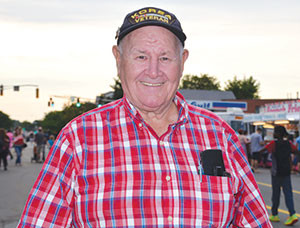
Somerville’s own Kenneth F. Cook served with distinction in the U.S. Army during the Korean conflict. — Photo by Claudia Ferro
By Gabriela Martínez
Kenneth F. Cook, known by many as the crossing guard for St. Catherine’s, was Private First Class and member of 196th Field Artillery Battalion in the U.S. Army during the Korean War. He did everything from operating 155mm Howitzer canons to manning the telephone lines and driving back for ammunition.
During his year in service, he was stationed in different cities in Korea and took part in one of the most significant battles of the war, known as Heartbreak Ridge. He remembers the cold snowy winters and the rainy summers. Despite the harsh conditions and the danger of incoming attacks, Cook survived the war without any major wounds.
His time there went by so fast, he said. “Yesterday I was 17. Today I’m 82.”
Cook was born in 1933 and grew up in North Brighton in a working class neighborhood that was predominantly Polish and Italian. He was the middle child in a family of nine children and had six brothers and three sisters.
“It was good growing up. We didn’t have all the modern conveniences. I didn’t see a television until I went to Fort Dix, New Jersey in 1950,” Cook said.
As a child growing up in Brighton, Cook played games like hopscotch and tag. He swam freely in the Charles River with his friends without thinking twice about polluted water.
One of his first jobs was in Allston, where he worked as a marker, cleaning stables and taking care of horses at a racing track that was once on Soldier’s Field Road, at a site that is now occupied by Artesani and Herter Parks.
Cook went into the service in 1950. He joined the regular army and had his basic training at Fort Dix in New Jersey. Before joining the army, Cook was in the National Guard. When he was done with basic training, Cook became part of the 105 mm battery, 9th Division Artillery, and stayed there until 1951.
He wanted to go overseas, but his superior wouldn’t let him because he was too young. “Talked to my sergeant and he said ‘if you really want to go, put in for the European command, because they always give you what you don’t want.’ Three days later I got my orders cut out. I was going to Korea,” Cook said. “I was a wild kid before that. I would have been in a lot of trouble had I not gone,” Cook said.
Cook came back from the Korean War on a ship that left from Japan and arrived in San Francisco. When they were passing under the Golden Gate Bridge, he saw Alcatraz in the distance and commented on how beautiful it was. Later on, one of his shipmates let him know that what he thought was beautiful was actually a prison. He said everything looked better because he was back in the United States.
“What would you like you eat?”—This was of the first questions Cook had to answer, after a year of living in rough conditions and eating rationed food. He ordered steak and fries.
“We ate anything we could get our hands on,” he said. One of the most common delicacies was rice balls, which are made from leftover rice. Cook stopped eating them after he discovered a fish eye in one of them.
Cook concluded his service in May 1953 and got offered a job at Lynn Insole Manufacturer, which paid 95 cents an hour. If he had not found a job right away, Cook said he would have gone back to the army.
In 1955, he got married with Virginia Cook and moved to Somerville.
In 1962, he started working for Industrial Adhesives. Later, he got hired at Somerville Lumber, where he sold construction supplies. He retired from that job in 1998.
A friend of Cook’s who worked for the Somerville Police invited him to work as a crossing guard. He accepted and has been working as a crossing guard for 14 years helping students from St. Catherine of Genoa cross the street.
After finding our Cook’s sister, Margaret Pitts, has pancreatic cancer, Scot Silviera, the fifth grade teacher at St. Catherine’s, had his class write get well cards for her. “I sent them to my sister and she was ecstatic,” Cook said. “They’re really, really good kids.”
Cook calls Lorna Terp, his other sister in Vermont every day, sometimes two or three times a day. “He is very generous,” Terp said. “I know there was a lady in his neighborhood who needed a wheelchair. He husband was really sick. He gave it to her. He gave her a wheelchair, a hospital bed.”
Cook belongs to Korea Veterans of America, chapter 300. He has meeting and events every year, including a Christmas party.
He also teaches students about the history of the Korean War. One of his friends, who works as a teacher, invited him to Winchester High School to give class about the Korean War. He was also invited to Mr. Silviera’s fifth grade class and to Somerville High School.















Reader Comments